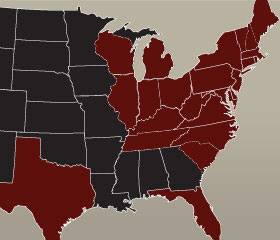Internet Sting Operations
Sex crime sting operations are on the rise as popularized in television shows such as To Catch a Predator. Law enforcement agencies throughout the country are increasingly trying to lure and catch people via the internet. Police will visit internet chat rooms, dating sites and pornographic sites posing as minors in order to lure adults into having sexually explicit conversations.
Sting operations occur regularly on some of the largest and most trusted web sites such as MySpace, Facebook, AOL, Match.com and Yahoo. The undercover police will often lure unsuspecting adults into conversations and then gradually introduce incriminating facts such as being under the age of 18. The deception can include the officer lying about their identity and sending photographs of other people or even other adults all in attempt to keep the conversation going.
Beware of any public internet web site. Do not assume that your privacy is protected, and do not assume that police must tell the truth. The mere act of having an sexually explicit conversation with someone whom you think is a minor is a crime.
Internet sting operations are just one of many sex sting operations that occur throughout the country. Everyone from politicians to music stars to ordinary citizens is at risk of being snared. A few of the better known sting operations are listed below on this page.
Notable Sting Operations
OPERATION HAMLET
Date: On August 9, 2002, U.S. Customs Service Commissioner Robert Bonner announced the results of an investigation dubbed Operation Hamlet.
Subject: The investigation centered on a group of approximately 20 individuals who were molesting their own children and trading the images and videos with others in the group.
Background: Operation Hamlet began in November 2001 when a group called Save the Children was alerted to a picture of a young girl being abused by an unidentified man. A company logo was visible in the picture and Save the Children alerted the National Police in Denmark, where the company was located. Within 24 hours the man was identified and apprehended along with his wife. A search of their home and computer equipment revealed information about others in the group, including a Clovis, California father of four who appeared to be the ringleader.
Results: Twelve Americans and ten Europeans were arrested in connection with the group. One member was found with more than 1 million images and 450 CDs containing hardcore pornography and child abuse. Thirty-seven children in the United States and eight children in Europe were rescued and taken into protective custody.
OPERATION CANDYMAN
Date: On March 18, 2002, FBI Executive Assistant Director Bruce Gebhardt and Attorney General John Ashcroft announced the first phase of Operation Candyman.
Subject: The investigation centered on a Yahoo! Egroup that invited people to trade pictures of child pornography. The FBI estimates that there were more than 7,000 subscribers to the group, with around 2,400 living abroad. Those subscribing to the Candyman group were targeted in this investigation, but other Egroups were under scrutiny at the time Candyman was announced.
Background: Operation Candyman began in January 2001 when an undercover FBI agent joined the site. He had instant access to about 100 images and video clips, most of which showed prepubescent children engaged in sexual acts with themselves and adults. Within a month, the agent received 500 e-mail messages, some of which included child pornography. By the time Candyman was made public, all 56 FBI field offices were involved with the investigation.
Results: More than 100 Americans have been arrested. The group administrator, Mark Bates, was sentenced to 30 years in prison. Those arrested included day care workers, clergy members, law enforcement personnel, a U.S. Army Sergeant, and others in positions of trust or authority. German authorities are investigating 1,400 people in connection with Candyman and British police have identified more than 2,000 people suspected of acquiring illegal material from the sites in question.
OPERATION AVALANCHE
Date: On August 8, 2001, Attorney General John Ashcroft and Chief Postal Inspector Kenneth Weaver announced Operation Avalanche. By this time, the two-year undercover operation had already made more than 100 arrests on charges related to child pornography, and had secured the convictions of the masterminds of the business, Thomas and Janice Reedy.
Subject: The investigation centered on Landslide Productions, Inc., a Fort Worth Internet business engaged in advertising and conspiring to distribute child pornography. Landslide offered subscriptions to more than 250 web sites, many of which were devoted to child pornography. Landslide collected 300,000 subscribers, earning as much as $1.4 million dollars a month. It is known as the largest commercial child pornography enterprise ever encountered.
Background: Operation Avalanche began in 1999 when a Minnesota postal inspector passed a tip along to another inspector in Fort Worth who then contacted the Dallas police. Working with thirty federally funded Internet Crimes Against Children (ICAC) Task Forces, the Department of Justice, and the U.S. Postal Inspection Service, the Dallas Police department infiltrated Landslide and arrested its owners.
Results: Thomas and Janice Reedy of Landslide Productions were sentenced to 1,335 and fourteen years in prison respectively. More than 250 Americans have been arrested to date, but the subscriber list contained names of more than 35,000 Americans. People from 60 countries have subscribed to Landslide sites. Police in Switzerland are investigating around 1,300 people in Operation Genesis, the German police have launched Operation Pecunia to investigate more than 1,400 suspects, British authorities have launched Operation Ore to investigate more than 7,200 names, and Ireland conducted more than 100 raids as part of Operation Amethyst. Canada is also investigating suspects in Operation Snowball.
OPERATION BLUE ORCHID
Date: On March 26, 2001, the U.S. Customs Service announced results of an on-going international child pornography investigation called Operation Blue Orchid.
Subject: The investigation centered on the Blue Orchid Web site, run by Russian pedophiles for the purpose of posting and selling pictures and videos of young boys being sexually abused.
Background: Operation Blue Orchid began in May 2000 when the Moscow Police Department contacted the U.S Customs Attaché for help identifying the owners of the Blue Orchid site. The Attaché requested the Customs Service CyberSmuggling Center in the United States to make an undercover purchase of pornographic materials. The information gleaned from the purchase led Moscow police to two men responsible for producing and distributing a number of tapes depicting sodomy and rape of young boys.
Results: Moscow police seized 400 videos, equipment, and billing records. The resulting information led to more than 50 leads around the world. Investigations have been completed in Sweden, Denmark, and the Netherlands and are ongoing in several other European nations. The U.S. Customs Service has announced four arrests and the execution of fifteen other search warrants across the country.
OPERATION SNOWBALL
Date: Details of Canada’s on-going Operation Snowball first appeared in the press on January 16, 2003.
Subject: The investigation centers on the more than 2,300 Canadians who allegedly subscribed to child pornography through Landslide Productions, a Fort Worth, Texas-based company.
Background: Operation Snowball can trace its roots to the start of the United States’ investigation, Operation Avalanche, in April 1999. When American law enforcement officers analyzed Landslide’s business records, they discovered hundreds of thousands of subscriber from all over the world. Canadian investigators went to Dallas in June 2000 to retrieve the names of 2,329 Canadians. Six months later, police held a private briefing to determine a national strategy to investigate the crimes.
Results: By the time of the first press reports, Canadian police had made up to 100 arrests. This represents less than five percent of the names contained on a list of Canadian subscribers. Canadian police say the country is woefully unprepared to handle such large-scale investigations.
OPERATION PREDATOR
Date: On July 9th, 2004 The Department of Homeland Security’s new Bureau of Immigration and Customs Enforcement (ICE) delivered a pointed message to any foreign national who might come to the U.S. planning to sexually exploit American children for pleasure or for profit.
Subject: Operation Predator is an initiative developed by the Department of Homeland Security’s Bureau of Immigration and Customs Enforcement (ICE) to protect children world-wide. As the President has made clear anyone who harms a child will be a priority target of law enforcement in this Administration. This comprehensive DHS program was to identify child predators and remove them from the United States (if subject to deportation). Operation Predator would also work to identify children depicted in child pornography to help rescue them, and to assist in prosecuting the people responsible for making and distributing the pornographic material.
Background: This Homeland Security initiative is being driven by ICE’s Cyber Smuggling Center in conjunction with every facet of the ICE organization. In addition, ICE will partner with other important law enforcement entities such as DHS’s own Bureau of Customs and Border Protection, the U.S. Secret Service, the U.S. Postal Inspection Service, the FBI, and other state and local law enforcement agencies. This initiative is also being conducted in partnership with the National Center for Missing and Exploited Children (NCMEC).
Results: Since March 1, ICE has made 88 additional arrests, garnered 56 indictments, obtained 77 convictions, executed 134 seizures of contraband and launched 192 new investigations into suspected sexual predators of children.




